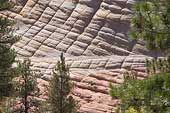
|
|
Related Documents
Download Options
| Image Name | Width x Height | Size |
|---|---|---|
| SIA2477.jpg | 640 x 441 | 92K |
| SIA2477.jpg | 1200 x 827 | 301K |
| SIA2477.jpg | 3504 x 2416 | 1M |
Caption
Patterns in Stone
The Navajo sandstone of Checkerboard Mesa also forms the spectacular cliffs within Zion. This geographically widespread formation reaches a thickness of 2,200 feet in the park and consists almost entirely of desert sand dunes. The Checkerboard Mesa, made of Navajo sandstone, has two sets of lines forming the checkerboard pattern.
The horizontal lines, commonly called cross bedding, represent layers of wind-blown sand that built up into sand dunes. These dunes were then buried, and the sand grains glued together by calcite and iron oxide to form sandstone. Crossbedding can be seen in many place along the Zion Mt. Carmel Highway.
The vertical lines are less common. They are actually shallow cracks that result from stress and erosion on the rock surface. These cracks are probably caused by expansion and contration, temperature changes, wetting/drying, or a combination of these processes.